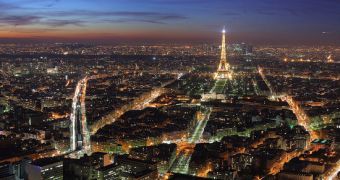This Wednesday, the French Minister for Ecology Delphine Batho went public with the news that the country is soon to roll out a so-called illumination ban. As its name more than thoroughly suggests, this ban will force various buildings and facilities to switch off their lights during night-time.
Information made available to the general public thus far says that France's illumination ban will come into effect starting July 1, and that the properties which will have to abide by it are non-residential ones.
Needless to say, the illumination ban is expected to significantly improve on the country's ecological footprint. This is because the country will burn less energy during night-time, and because light pollution will also be reduced.
For those unaware, light pollution negatively impacts on natural ecosystems, seeing how it toys with various animals' natural biorhythm. Furthermore, it causes sleep disturbances in the case of people.
According to Business Green, this ban will translate into France's saving roughly 2TWh of power on a yearly basis, and into the country's cutting down on its greenhouse gas emissions by 250,000 tonnes per year.
Still, those who very much enjoy spending their holidays in France need not worry about a rather dark Christmas.
Quite the contrary: France's high officials wished to reassure both any potential tourists, and the country's residents that the ban could be lifted whenever special events and celebrations were in order.
Furthermore, the illumination ban is not to affect major touristic attractions.
For the time being, concerns are being raised with respect to how the country's image will be affected by this ban, especially given the fact that many foreigners refer to Paris as the “city of lights.”
As well as this, there are many who believe that the illumination ban will up security concerns nationwide, seeing how robbers and the like will probably find it much easier to carry on with their night-time “working” agenda.

 14 DAY TRIAL //
14 DAY TRIAL //